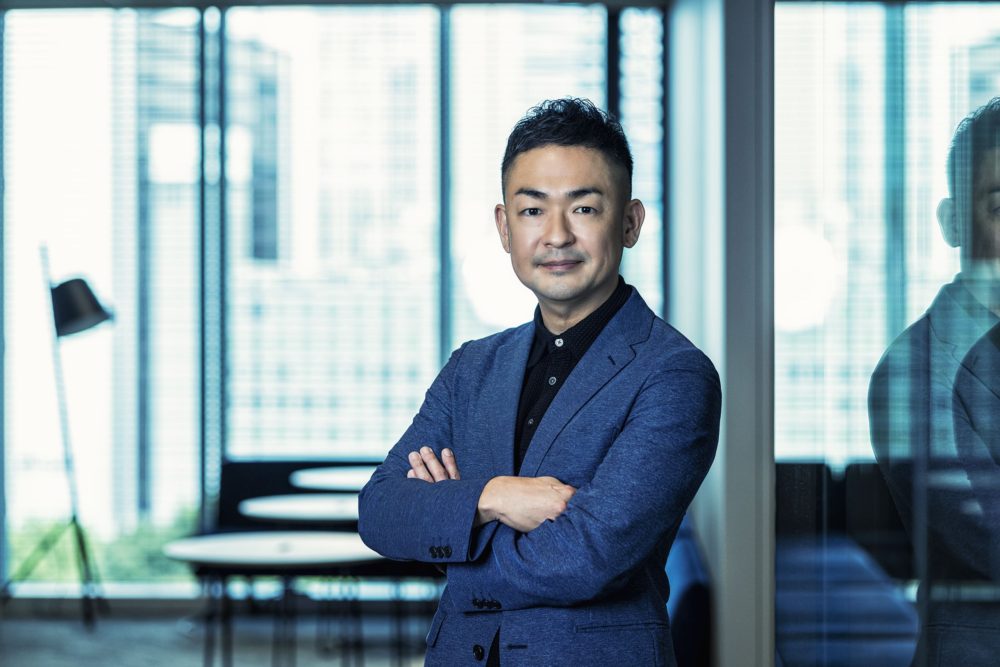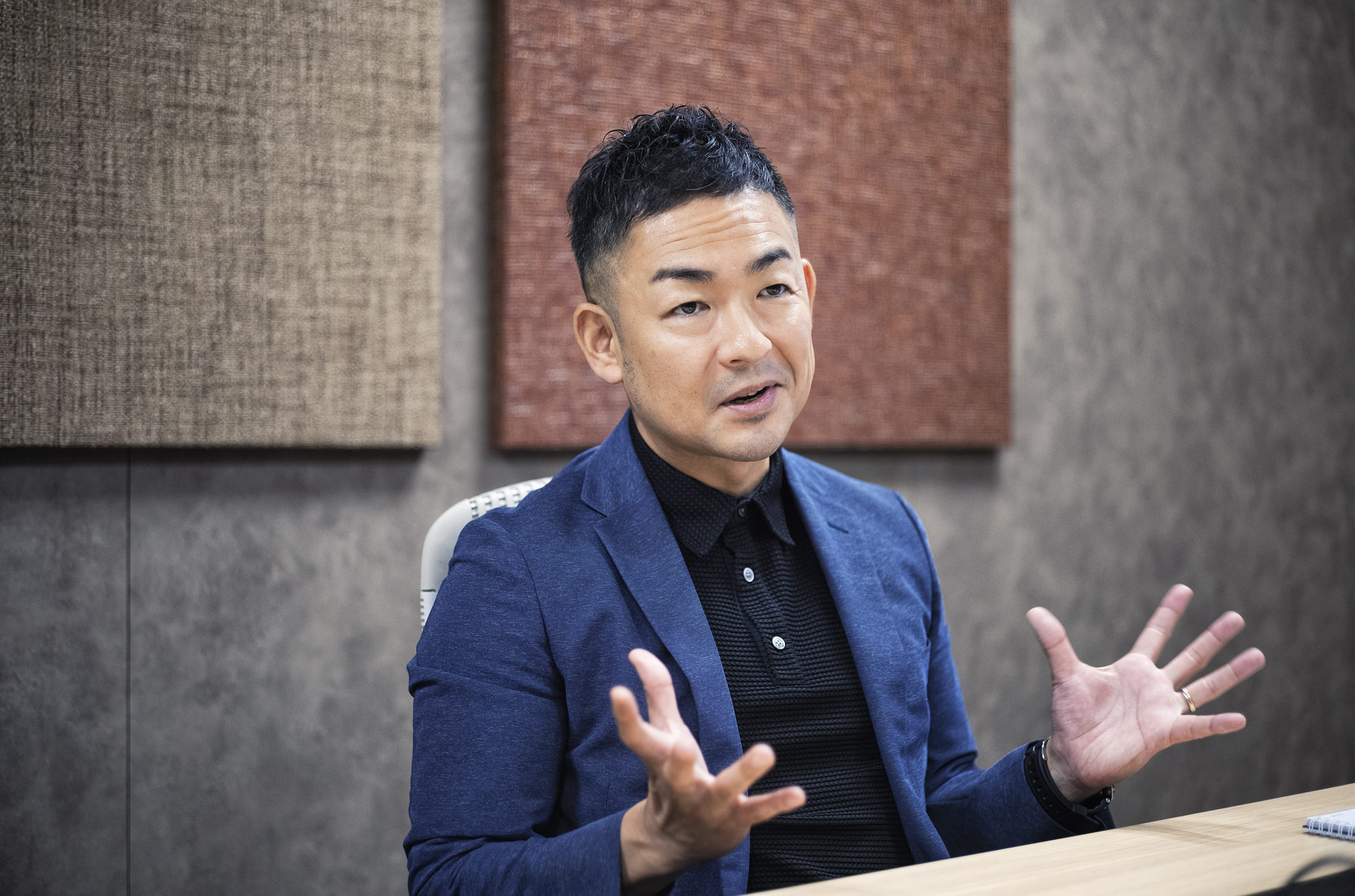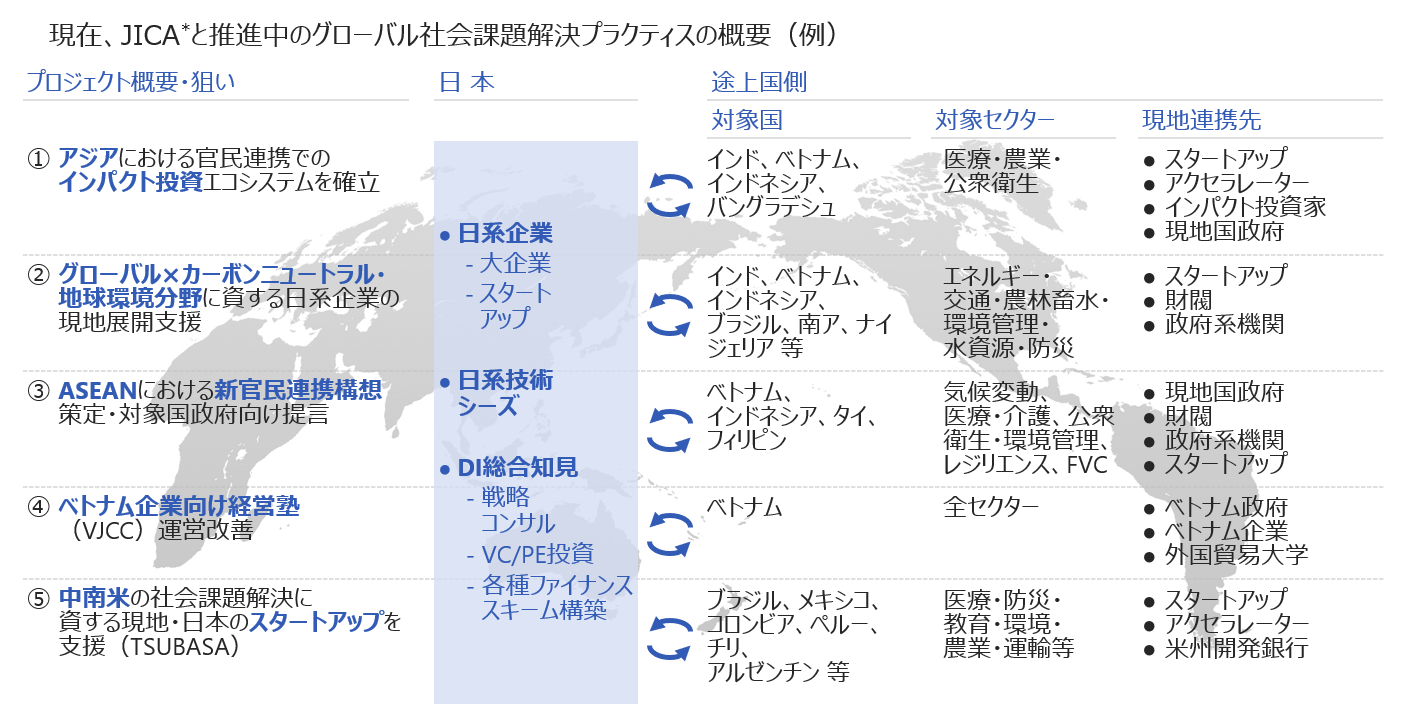
Leading a Global Business Producers Group Beyond Boundaries
Makoto Miyauchi, who took on the role of Global Head of Dream Incubator Inc.’s (DI) Third Division in April 2023, leads a diverse organization. He defines the fusion of strategic consulting and incubation as “DI-ism” and promotes “glocalization” across various target countries, primarily in Asia. He is dedicated to business production activities that transcend boundaries in various aspects. In this interview, he will discuss the current state and prospects of the Third Division.
Global Head, Third Division
Makoto Miyauchi
He graduated from the University of Tokyo with a degree in Economics. He then obtained a Master of Business Administration (MBA) from New York University’s Stern School of Business. He joined DI after working at Sojitz Corporation. His main responsibilities involved developing new business and growth strategies for large corporations, supporting the creation and implementation of global expansion strategies, and participating in initiatives to create next-generation industries and social impact financing schemes through public-private partnerships. Between 2014 and 2020, he was stationed at DI Vietnam, focusing on promoting projects centered on creating new industries based on various public-private partnerships, with a strong emphasis on addressing social issues and developing new businesses in the emerging domestic demand sector across the ASEAN region. He became the head of the Vietnam office in 2017. Upon returning to Japan in 2020, he assumed the position of Global Head of the Third Division in 2023.
Maximizing Global Impact with DI-ism

—- Please tell us about the philosophy and initiatives of the Third Division
Globally, we are actively implementing a fusion of strategic consulting and incubation, which we refer to as industry and business production, serving as a central element of the DI ethos. The Third Division is dedicated to “glocalizing” the DI ethos, which holds great significance. As we operate in numerous countries, we strive to adapt the DI ethos to each country’s specific circumstances, ensuring a personalized approach tailored to the unique needs of each nation.
In our pursuit of “glocalization,” we are committed to the guiding principle of “crossing boundaries,” seeking to amplify the global impact of the Japanese industrial sector. This involves engaging in business production activities that transcend traditional business boundaries and values, including strategic consulting + incubation, public + private collaborations, balancing economic returns with social impact, and bridging the gaps between large corporations and startups, technology, business, and creativity, as well as client services and our own business. Additionally, we prioritize collaborative initiatives with the Dentsu Group on the creative front.
—- By “crossing boundaries,” what kind of value are you providing?
We are focusing on reconciling social problem-solving and business impact at a high level. From this perspective, we emphasize creating ambitious visions that transcend the boundaries between the public and private sectors, as well as large corporations and start-ups and place a strong emphasis on building alliances to achieve this.
In recent years, our approach tailored for private companies, known as the 3E (Entry to devise an entry strategy from 0 to 1, Expansion to drive business growth from 1 to 10, Evolution to connect social issue solving to business from 10 to 100), has received high praise. Since establishing our first overseas base in Vietnam in 2007, we have been engaged in investment in local companies and business production through Japan-Vietnam public-private partnerships for over 15 years, and we are pleased that our accumulated local insights and network have been valued.
Furthermore, in India, we have also invested in 30 promising start-ups, and we are being recognized for our commitment and realism in business production activities based on these capabilities.
—- What are some specific examples of global x social issue solutions?
I’d like to introduce a few projects in collaboration with JICA to promote the “Global x Social Issue Solutions” practice.

The first initiative involves the real-time development of a start-up nurturing ecosystem in developing countries through public-private partnerships. We are driving discussions by engaging a wide range of stakeholders from various countries to determine the mechanisms and frameworks for providing support to start-ups, including investment, while closely collaborating with the governments of Japan and developing countries.
The second initiative focuses on bridging the various social challenges faced by developing countries with the technological solutions and expertise present in Japan’s industrial sector. We meticulously analyze the social challenges in the field of carbon neutrality and environmental sustainability in local areas, select and match Japanese technologies and solutions that contribute to solving these challenges in each country, and provide accompanying support to enable the commercialization and simultaneous resolution of these social issues.
The third initiative, known as PSE (Private Sector Engagement), represents a new form of collaboration between the public and private sectors. It aligns with our approach to industrial production in a mutually complementary manner. Essentially, it involves the government taking the lead to actively engage ambitious private enterprises, bringing to life envisioned concepts, creating mechanisms, initiating behavioral changes, and generating pilot projects in Southeast Asia.
The fourth initiative involves the planning and execution of a business school to develop leaders of large and small enterprises in Vietnam. We design courses that consider the strengths of Japan and the specific business environment in Vietnam, aiming to foster new business relationships between Japan and Vietnam.
Lastly, the fifth initiative is the “TSUBASA” program. This program entails planning and executing a dynamic acceleration program designed to address societal challenges with a greater scale and impact than that of Japan, bringing emerging, cutting-edge startups from Japan to 26 countries in Central and South America.
In addition to creating new mechanisms that achieve a high level of balancing the resolution of social issues in developing countries as a co-creation partner with JICA and bringing benefits to the Japanese industrial sector, we are also focusing on strategic consulting for the creation of new businesses and social issue-solving business in Southeast Asia, India, and other areas, and on producing new business opportunities in the rapidly recovering inbound market.
—- How do you perceive the trends in business related to addressing societal challenges in recent years?
Compared to 10-20 years ago, the advancement of international opinion and technology has greatly expanded the potential and scope for resolving societal challenges through business. In discussions with government officials, corporate leaders, and startups both domestically and internationally, the range of target areas for addressing societal challenges through business has widened significantly, with a speed of realization that surpasses past comparisons. Additionally, the geopolitical importance of diplomacy in business, including the current situation in Ukraine, has rapidly increased. This highlights a renewed recognition of the last opportunity for Japan to leverage the collective efforts of the public and private sectors to pursue Japan’s presence and impact, particularly in the Asia-Pacific region.
Until now, large Japanese companies have been doing business in developing countries from the perspective of transferring their manufacturing and sales bases. However, the stage is now clearly shifting to solving social issues and creating innovation with a view to the 3 billion people in the middle class, especially in Asia. Against this backdrop, DI and JICA are keenly aware of the need for a new grand design for the creation of new industries through the fusion of Japan and developing countries, the public and private sectors, as the next model for conventional cooperation and ODA to developing countries.
To provide a clear example, let’s consider the railway sector. While conventional ODA efforts have focused on infrastructure development, such as constructing numerous railways in major cities across Asia, the current environment is characterized by intense competition with other countries. If we reframe Japan’s strength as a “railway-led regional development system,” it goes beyond just laying down railway infrastructure. By incorporating Japan’s station-adjacent commercial facilities as a platform for promoting Japanese culture, we can expand the scope from mere railway infrastructure to a broad perspective of Japan’s cultural influence. By integrating Japanese technology and expertise to introduce electric mobility sharing stations at railway stations, we can also effectively assist citizens in their last-mile transportation. In essence, this calls for a redefined collaboration between the public and private sectors, as well as a reevaluation of Japan’s competitiveness, signaling the expansion of our support in these areas.
Furthermore, we are entering an era where start-ups are increasingly becoming pivotal players in addressing societal challenges, particularly in developing countries. For instance, the effectiveness and impact of investing in emerging local start-ups in the education sector within developing nations are beginning to rival the construction of a primary school in a rural area for 1 billion yen. Collaborating with start-ups is globally evidencing itself as a more adept and scalable approach to solving societal challenges and fostering progress in developing countries.
Going Beyond Boundaries in Organizational Management

—- What is the organizational structure of the Third Division, which manages expansive and diverse business production?
Our organizational structure is quite unique. Our team members are spread across four countries, including the Tokyo office and key Southeast Asian bases (Vietnam, Indonesia), and India. We have a highly diverse division, with a ratio of 4 Japanese to 6 non-Japanese members and a roughly 4 to 6 male-to-female ratio. The members from the four bases, who share and embody the DI ethos, are increasingly crossing nationalities and locations, leading to more opportunities for collaborative projects and initiatives across borders.
—- As a team and as individuals, what thoughts and feelings drive your daily work?
The new industry, being a fusion area by definition, demands that we always go beyond the boundaries of existing domains. My background in general trading companies leads me to define the business producer model that our company advocates as nearly equivalent to a general trading company professional. Operating like a general trading company, crossing diverse domains across the entire organization, and addressing societal and corporate challenges from a global perspective are at the core of my being and form the motto for departmental operations.
While we share the DI ethos and goals among team members, there is a wide range of diversity in terms of everyone’s nationality, values, and personalities, resulting in a gradient in what each individual wants to achieve at DI and what they want to focus on in their careers. Therefore, in departmental management, we always strive to be mindful of each individual’s preferences in fostering and optimizing the project portfolio. We believe that by considering not only the achievement of business goals but also the self-realization of each member, we can ensure the flexibility and sustainability of the organization.
It is not an easy job, but if there are lifetime goals that one is willing to stake their life on achieving, then the mind and body should not break. I believe it is extremely important to fully respect what each individual wants to achieve at DI and to bring out the strengths of each member.
The Future Envisioned by the Third Division
—- Please share with us your vision for the future ahead
We will continue to maintain the momentum of expanding co-creation areas with JICA, accelerating the global expansion of Japanese private companies, and exploring new opportunities in the inbound market, while moving forward with conviction towards further expansion. To achieve this, we will increase the number of business producers who resonate with our ideals and aspirations at all our bases in Japan, Vietnam, Indonesia, and India. By integrating individuals with new perspectives with our current members, we anticipate that the organization will gain depth through the multiplication of diverse talents. We aim to cultivate a dynamic strength within diversity and establish a cycle of self-sustaining expansion within the organization.
—- Finally, could you share a message with our readers?
We invite participation from professionals in the business, government, and academic sectors, particularly Japanese companies aiming to create impactful global industries and businesses. Our current focus is on business production in India, expanding beyond Southeast Asia. India isn’t just a relocation hub for traditional Japanese industries; it ranks third globally in unicorn (companies valued at over $1 billion) creation, positioning itself as a hub of innovation. There’s a growing drive to merge India’s innovation with Japan’s industrial strengths and launch rapid global expansion from India. Whether you’re in the early stages of planning or have a fully developed concept, we encourage you to seek our consultation.
Regarding recruitment, we are looking for individuals who align with DI’s mission of implementing the business production approach on a global scale. While possessing conceptualization and strategic planning skills is crucial, having a mindset capable of thriving on a global scale as an individual is even more valuable. We seek individuals who can confidently engage in global communication, are interested in genuine business production extending beyond strategic consulting and can drive integrated ventures with a strong sense of ownership. We are eager to welcome such individuals to our team.

